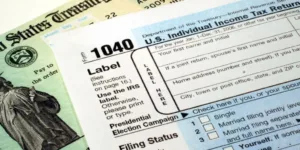The tax year is almost over, and while you may have time to file your taxes, it’s a great idea to take the right steps if you cannot pay your taxes on time. Sometimes, you receive money back, so you don’t have to worry about paying money come tax season.
But a study between 2012 and 2016 found that 17% of taxpayers had a federal tax bill that needed to be paid.
What was the average bill during this span? A staggering $5.294.
And in 2017, it was projected that nearly 30% of taxpayers would have to pay taxes. The trend, especially with people trying to make side money or start their own business, is only going to continue to increase over time.
The problem is that a lot of people live paycheck-to-paycheck.
Saving up money throughout the year to satisfy your tax bill can be very difficult. If you’re in a rut and don’t have the funds to pay your taxes, there are other options available to you.
File Your Taxes Anyway
You know that you owe the government money, and you can be sure that the government will find out that you haven’t filed your taxes. Why? Even if you can’t pay, it’s a good idea to file so that you can avoid the failure-to-file penalty.
The penalty assesses a 5% penalty for each month that you fail to file.
And this figure will max out at 25% of what you owe in taxes. So, if you owe $10,000 in taxes, you may end up owing $12,500 if you fail to file your taxes for five or more months after taxes are due.
The IRS will still impose a 0.5% penalty per month until the taxes are fully paid even if you file, but it’s far less than the 25% penalty you would face otherwise.
Pay What You Can
You’re not able to satisfy your entire bill, but you can satisfy a portion of the bill. In this case, it’s better to satisfy some of your bill rather than let it accumulate higher. The trick is knowing how much you’ll be able to pay.
If you know that you’ll be able to pay your bill in full within 120 days, you can enter into an installment agreement. Fees will apply, but you’ll be able to pay off your debt and can stop worrying about the IRS or debt collectors contacting you.
Last Resort Options
The IRS will want their money, and they will try to work out an agreement wherein they receive every last dime of what they’re owed. But when you can’t pay, there are a few options available to you:
- Offer in compromise. An offer in which you pay less than what’s owed. This is a strict application process, and you must meet a list of qualifications. If paying the taxes would put you into a serious financial hardship, you may pay less or nothing at all. Most accountants recommend this as your last resort.
- Temporary delay. If the IRS finds that you cannot pay your debt, they can put a temporary delay on what is owed. Interest will accrue at this time, but the delay will last until your financial condition improves.
Bankruptcy is another option. You can file Chapter 13 or Chapter 7 bankruptcy, and this can help you get back on a financially sound ground.
Chapter 13 requires an agreement to make payments to cover a portion of debt over a period of 3 – 5 years. “Tax debt can be included in the repayment plan, and people might secure plans that allow them to make payments they can afford. If they complete the repayment plans successfully, it is possible that the remaining tax balances will be discharged,” explains Randolph Law Firm, P.C..
Chapter 7 bankruptcy is a little different, and there are only some types of debt which may be able to be discharged under this bankruptcy option.
An accountant or attorney will be the best person to consult when trying to find a bankruptcy option that works best for you.
You also have the option of paying the debt on a credit card or securing a loan to be able to pay your debt. But remember, you’ll want to be able to repay any loans that you take out, or you’ll be charged a much higher interest rate for being late than you would with the IRS.








